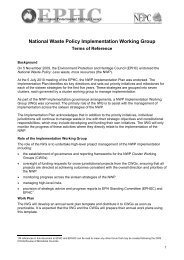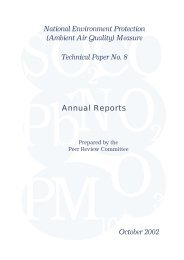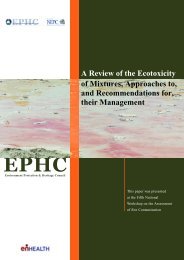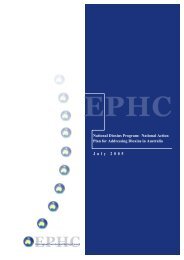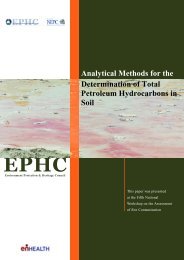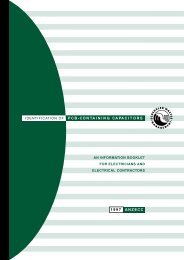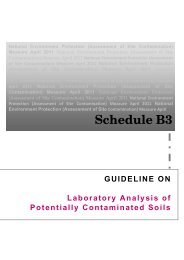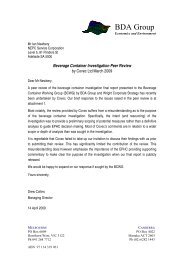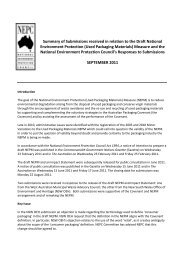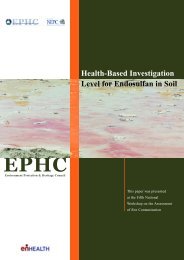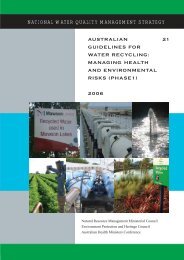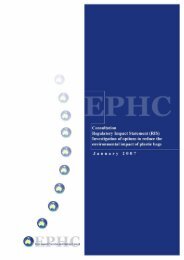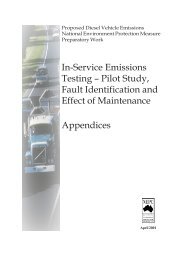Draft National Wind Farm Development Guidelines - July 2010
Draft National Wind Farm Development Guidelines - July 2010
Draft National Wind Farm Development Guidelines - July 2010
You also want an ePaper? Increase the reach of your titles
YUMPU automatically turns print PDFs into web optimized ePapers that Google loves.
A.6.6 Decommissioning<br />
Planning & Consultation<br />
The decommissioning of a wind farm project should occur in consultation with project<br />
stakeholders. As this will occur many years after construction it is likely that there will have<br />
been changes to the makeup of the local community and local area itself. As such, new<br />
stakeholders should be identified and the rehabilitation requirements should be cognisant<br />
of any changes which may have occurred in the area. Community involvement in<br />
assessing rehabilitation requirements is recommended.<br />
Technical Area Community Inputs<br />
It will be necessary to once again determine impacts and mitigation measures associated<br />
with landscape and EMI when decommissioning or rehabilitating the site.<br />
A.7 Cumulative Impacts<br />
The cumulative impact of multiple wind farm facilities in a region is likely to become an<br />
increasingly important issue for wind farm developments in Australia.<br />
Where multiple wind farm proposals exist in close proximity to the wind farm project under<br />
development, the following items should be considered:<br />
• The local community are likely to be familiar with the potential impacts of a wind farm<br />
in their region. As such the nature of enquiries may be different to that of a<br />
community who have little knowledge or experience of operating wind farms.<br />
Community participation activities should be developed cognisant of this fact, and<br />
adequate resources for dealing with these queries should be available (for example,<br />
the presence of technical experts at community information events).<br />
• The local community may be “fatigued” with community engagement processes. In<br />
other words, an abundance of community meetings, information sessions or materials<br />
about various developments, may result in community members tiring of attending<br />
local events or engaging in local discussions or activities. Consolidating<br />
communication and consultation activities with other developers may be beneficial,<br />
or developers may wish to consider using alternative methods for engaging the local<br />
community. Whilst always encouraged, it may be particularly prudent to ask key<br />
stakeholders the method and frequency of consultation they prefer and tailor the<br />
consultation plan to meet their requirements.<br />
• Developers should maintain a dialogue with other wind farm developers in the region<br />
to ensure that consultation and/or development activities are planned cognisant of<br />
each other, and opportunities for collaboration between developers could be<br />
explored. Such an approach is encouraged in order to limit the risk of consultation<br />
“fatigue” and subsequent disengagement from the process by the community and<br />
key stakeholders, which would be to the detriment of both developers.<br />
A.8 Practice notes<br />
A.8.1 Stakeholder Identification Checklist<br />
The checklist presented in Table A-1 is indicative only.<br />
When preparing the Communication and Consultation Plan/s, the relevance of these<br />
stakeholders to the individual wind farm development, and the stages when consultation<br />
with these stakeholders may be required, will vary considerably between projects.<br />
Furthermore, this list is not exhaustive; stakeholder types who are not listed in this table may<br />
also be present and developers should conduct further investigations to identify these.<br />
<strong>Draft</strong> <strong>National</strong> <strong>Wind</strong> <strong>Farm</strong> <strong>Development</strong> <strong>Guidelines</strong> – 2 <strong>July</strong> <strong>2010</strong> Page 33



